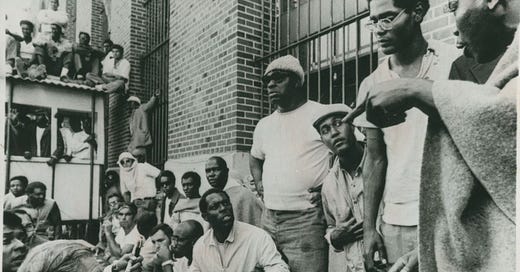Attica
The Oscar-nominated documentary, which is currently available to view free on many streaming platforms, is a searing look at a dark moment in our penal system.
When you’re making a documentary about a well-known historical event that occurred recently enough that most of the participants are still alive, one key factor that is simply essential is you must surprise the audience with information they probably didn’t know.
In that regard, “Attica,” which is one of the five nominees for the Academy Award for Best Documentary Feature, certainly passes muster. It’s currently available to watch for free on Showtime, Amazon, Vudu and many other streaming platforms.
Like many, I had a passing knowledge of the the most violent prison uprising in American history, which claimed 43 lives in 1971 in upstate New York, 10 of them prison guards. I knew the prisoners had petitioned for better treatment and living conditions, and were still in the midst of negotiations when law enforcement forces swooped in, a brutal repression that claimed dozens of lives.
Among the surprises (for me): the guards were entirely white, while the prison populations was mostly Black and brown. The film, directed by Stanley Nelson and Traci Curry, explores the disconnect between the people in the small town, where about half the populations worked at the state prison, and the inmates drawn largely from the New York City area.
One of the most stunning facts, repeated by dozens of prisoner eyewitnesses, is that the guards refused to even speak to them outside of giving orders. Prisoners referred to Attica as “the last stop,” the hardest place to serve time there was, were beatings and torture were commonplace. Even everyday indignities like not having enough toilet paper were part of the treatment.
Another revelation: even though the prisoners held knives to the throats of their hostages when the assault began, all of them died of gunshot wounds from state troopers. Not one throat was slashed.
The documentary draws historical footage from what was possibly the first mass media event of its kind to take place, with news crews and photographers swarming around the facility. And there are interviews with dozens of inmates, as well as men who were on the negotiating committee and family members of the corrections personnel.
Make no mistake: “Attica” is very much a point-of-view documentary, which sets out to look at the injustices of how the prisoners were treated and why their uprising, rebellion, riot — whatever you want to call it — was put down at the urging of a governor (Nelson Rockefeller) and president (Richard Nixon) who saw it as an opportunity to roll out their “law and order” platform.
But it does take the effort to talk to some of the townspeople and those who lost loved ones to give their perspective and let them vent. In many ways they were trapped in the middle, not responsible for the tragedy but part of the overall disconnect between the residents of Attica and the two thousand-some men who lived there in the prison, tired of being seen as “beasts” rather than human beings.
The prisoners are not elevated to sainthood, either. There’s frank talk about every prisoner being “a law unto themselves” after they took over the prison. They admit enjoying giving a beating to the guards who kept them down. There’s also appraisal of some of the mistakes they made during the negotiations in having certain key figures take to grandstanding rather than truly looking out for the best interests of the entire prison population.'
In the end, Commissioner of Prisons Russell G. Oswald agreed to 28 of the prisoners’ 30 demands, the exceptions being removing the current warden and granting total amnesty for all crimes that took place during the uprising. This last one seemed possible, but then William Quinn, a guard who had been hospitalized during the initial assault, died on the third day — irrevocably altering the course of events.
“There’s no clemency for murder,” one member of the committee of outside negotiators observes.
I learned a lot watching “Attica,” the chief being how the daily treatment of people like chattel rather than men degrades their soul. Even the worst offender is worthy of the basic human dignity these prisoners were denied.
Is what they did right? No, there’s no zero-sum reckoning with their heinous actions. But it’s clear that the mass slaughter of the prisoners at Attica by gunfire was a far more egregious act of violence and depredation than when the taking of a prison.





